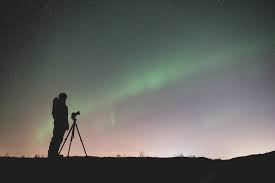
Noctourism, the practice of engaging in nighttime travel experiences, is poised to become a significant trend in 2025. Travelers are increasingly seeking unique after-dark adventures, from stargazing in remote deserts to participating in nocturnal cultural events. This shift reflects a desire to escape daytime crowds, connect with nature, and experience destinations from a different perspective.
The allure of noctourism lies in its ability to offer serene and often transformative experiences. Nighttime activities such as stargazing, witnessing cosmic events, and exploring natural landscapes under the cover of darkness provide a sense of wonder and tranquility that is hard to replicate during daylight hours. Additionally, cooler temperatures and the absence of crowds make nocturnal explorations particularly appealing.
Top Noctourism Destinations
Several destinations around the world are renowned for their exceptional nighttime offerings:
Nocturnal Cultural Experiences
Beyond natural landscapes, noctourism encompasses cultural and historical experiences that come alive after dark:
Planning for Noctourism
As noctourism gains popularity, travelers are advised to plan their trips around specific nighttime events or seasons that offer optimal experiences. For instance, the Northern Lights are best viewed between August and April in regions like Iceland and Norway. Similarly, certain cultural festivals occur on specific dates, requiring advance planning to ensure participation.
Considerations for Nocturnal Travelers
Engaging in noctourism requires certain considerations to ensure a safe and enjoyable experience:
The Future of Noctourism
The rise of noctourism reflects a broader trend towards seeking unique and meaningful travel experiences. As more destinations recognize the value of their nighttime offerings, it's anticipated that infrastructure and services catering to nocturnal travelers will expand. This includes the development of dark sky parks, nighttime cultural events, and guided nocturnal tours.
Noctourism offers travelers an opportunity to experience the world in a new light—or lack thereof. Whether it's marveling at the cosmos in a remote desert or participating in a vibrant night festival, the experiences gained after dark can be both enriching and unforgettable.
(Source:www.cnbc.com)
The allure of noctourism lies in its ability to offer serene and often transformative experiences. Nighttime activities such as stargazing, witnessing cosmic events, and exploring natural landscapes under the cover of darkness provide a sense of wonder and tranquility that is hard to replicate during daylight hours. Additionally, cooler temperatures and the absence of crowds make nocturnal explorations particularly appealing.
Top Noctourism Destinations
Several destinations around the world are renowned for their exceptional nighttime offerings:
- NamibRand Nature Reserve, Namibia: Recognized as one of Africa's first International Dark Sky Reserves, this area offers unparalleled stargazing opportunities. The clear, unpolluted skies provide breathtaking views of the Milky Way and other celestial phenomena.
- Atacama Desert, Chile: Known for its arid landscape and high altitude, the Atacama Desert is a prime location for astronomical observations. Visitors can experience crystal-clear views of the night sky, making it a haven for both amateur and professional astronomers.
- Canary Islands, Spain: Islands like Tenerife and La Palma are home to Starlight Reserves, areas recognized for their exceptional efforts in preserving the night sky. The combination of high altitudes and minimal light pollution makes these islands ideal for stargazing.
- Aoraki Mackenzie International Dark Sky Reserve, New Zealand: This reserve offers some of the darkest skies in the world, providing visitors with stunning views of constellations and the Southern Lights.
Nocturnal Cultural Experiences
Beyond natural landscapes, noctourism encompasses cultural and historical experiences that come alive after dark:
- Tai Hang Fire Dragon Dance, Hong Kong: This traditional event features a dragon studded with burning incense sticks parading through the streets, creating a mesmerizing spectacle for onlookers.
- Penguin Parade, Australia: Each night on Phillip Island, little penguins emerge from the sea and waddle to their burrows, offering visitors a charming and educational wildlife experience.
Planning for Noctourism
As noctourism gains popularity, travelers are advised to plan their trips around specific nighttime events or seasons that offer optimal experiences. For instance, the Northern Lights are best viewed between August and April in regions like Iceland and Norway. Similarly, certain cultural festivals occur on specific dates, requiring advance planning to ensure participation.
Considerations for Nocturnal Travelers
Engaging in noctourism requires certain considerations to ensure a safe and enjoyable experience:
- Safety: Navigating unfamiliar areas at night can pose challenges. It's essential to be aware of local safety guidelines and consider guided tours when exploring remote locations.
- Equipment: For activities like stargazing or night photography, appropriate equipment such as telescopes, cameras with night settings, and warm clothing is advisable.
- Environmental Impact: Travelers should be mindful of their impact on natural habitats, especially when engaging in nocturnal wildlife observations. Following local guidelines helps in preserving these environments for future visitors.
The Future of Noctourism
The rise of noctourism reflects a broader trend towards seeking unique and meaningful travel experiences. As more destinations recognize the value of their nighttime offerings, it's anticipated that infrastructure and services catering to nocturnal travelers will expand. This includes the development of dark sky parks, nighttime cultural events, and guided nocturnal tours.
Noctourism offers travelers an opportunity to experience the world in a new light—or lack thereof. Whether it's marveling at the cosmos in a remote desert or participating in a vibrant night festival, the experiences gained after dark can be both enriching and unforgettable.
(Source:www.cnbc.com)





